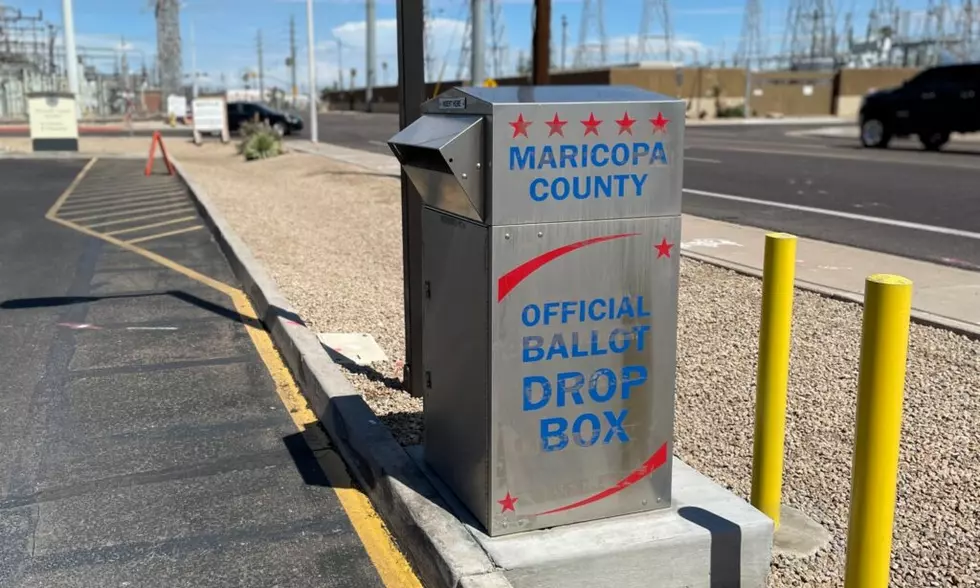
Arizona Senate committee clashes over election bills amid false claims of fraud
Joe Duhownik
PHOENIX (CN) — Tempers flared at a Arizona Senate election committee meeting after Democrats accused Republicans of pushing election conspiracy theories that are reducing the public’s faith in election integrity.
State Senator Juan Mendez, a Democrat from Tempe, said Republicans are to blame for the very mistrust in elections they claim their bills are aiming to fix. This came after heated discussion on SB1170, which would prohibit unmonitored ballot drop boxes.
Lawsuits were filed after multiple reports of armed men in tactical gear guarding ballot drop boxes during the 2022 election. Many who guarded the drop boxes did so under the false pretense that dropping off more than one ballot at a time is always illegal. Arizona law allows individuals to drop multiple ballots if doing so for a household or family member, or for a person of whom you are a direct caregiver.
Democratic lawmakers said during the Monday evening committee meeting that the bill would encourage citizens to take monitoring the drop boxes into their own hands.
“I’ll be blaming you when this bill gets somebody shot,” Mendez roared.
“You’re out of line,” state Senator Wendy Rogers, a Republican from Flagstaff and the committee chair, yelled in return. She cut his explanation of his vote short, which he protested.
The two went back and forth until another senator requested a rules attorney settle the matter. Mendez wasn’t given more time to explain, and the vote moved along.
Rogers reiterated to the committee that she doesn’t allow the term “conspiracy theory” to be used while in session. But Mendez and other Democrats consistently described election fraud claims as such.
Mendez’s conflict with Rogers began minutes before, just after Rogers admonished a guest speaker for relying on anecdotal evidence rather than data.
Jodie Liggett, representing the Arizona League of Women Voters, said she has heard from many league members from rural and tribal land that they “desperately” rely on drop boxes to vote and fear what the bill will do to the amount of them and therefore the accessibility to them.
Rogers asked her to provide specific data on which people rely on drop boxes. Liggett said she can’t do that.
“Anecdotal is a broad brush,” Rogers said. “I want facts.”
Mendez thought her statement was hypocritical.
“This entire committee has been based on anecdotal evidence,” he said. “This is the first time we’re taking a problem with it?”
Those in favor of the bill claim that it will stop so-called “ballot mules” from delivering stacks of fraudulent ballots into boxes, although there has been no evidence of widespread voter fraud. Despite Democrats insisting that requiring election staff at each drop box will lead to either more staffing shortages or the closure of drop box locations, the bill was moved to the House floor along party lines.
Republicans went after the issue of “ballot mules” earlier in the meeting as well, and tensions were just as high.
State Senator Jake Hoffman, a Republican from Queen Creek who sponsored SB1170, also sponsored SB1141, which would require someone dropping off ballots for others to confirm on a screen that they’re dropping off a ballot for a legally qualifying person when delivering early ballots.
“It does add an added layer of safety,” Hoffman said. “Voter confidence is at an all-time low.”
State Senator Anna Hernandez, a Democrat from Phoenix, asked who would oversee confirming whether a person is actually following that rule. Hoffman didn’t directly answer.
“I think we’d all agree we want people to follow the law, don’t we, Senator Hernandez?” he asked instead.
“I don’t think I said I didn’t, did I?” she replied.
Hoffman declined to answer a few other questions from both Hernandez and Mendez, saying instead, “I encourage you to read the bill.”
Those against the bill said the extra step added into the process would create lines in places where there typically aren’t, and will discourage voters for fear of accidentally committing a crime.
Ben Sheal, representing Opportunity America, called it “a direct attack on voting access.”
Republicans disagreed, saying the bill would only increase election security, which is something they said should be a nonpartisan issue.
The bill, like nine other election bills sent to the House floor Monday evening, received five Republican votes in favor and three Democratic votes in opposition.
